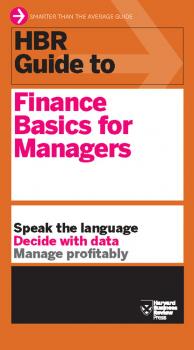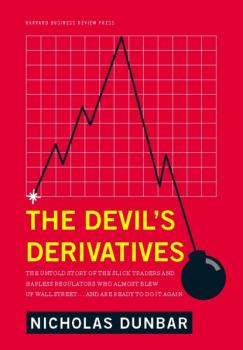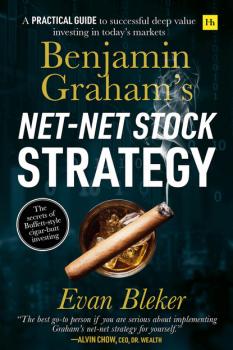Ценные бумаги, инвестиции
Различные книги в жанре Ценные бумаги, инвестицииKeeping Up with the Quants
Why Everyone Needs Analytical SkillsWelcome to the age of data. No matter your interests (sports, movies, politics), your industry (finance, marketing, technology, manufacturing), or the type of organization you work for (big company, nonprofit, small start-up)—your world is awash with data.As a successful manager today, you must be able to make sense of all this information. You need to be conversant with analytical terminology and methods and able to work with quantitative information. This book promises to become your “quantitative literacy" guide—helping you develop the analytical skills you need right now in order to summarize data, find the meaning in it, and extract its value.In Keeping Up with the Quants, authors, professors, and analytics experts Thomas Davenport and Jinho Kim offer practical tools to improve your understanding of data analytics and enhance your thinking and decision making. You’ll gain crucial skills, including:• How to formulate a hypothesis• How to gather and analyze relevant data• How to interpret and communicate analytical results• How to develop habits of quantitative thinking• How to deal effectively with the “quants” in your organizationBig data and the analytics based on it promise to change virtually every industry and business function over the next decade. If you don’t have a business degree or if you aren’t comfortable with statistics and quantitative methods, this book is for you. Keeping Up with the Quants will give you the skills you need to master this new challenge—and gain a significant competitive edge.
Finance Basics (HBR 20-Minute Manager Series)
Intimidated by corporate finance? The numbers (and the jargon) can feel overwhelming–but you have to understand them to manage effectively. Finance Basics explains the fundamentals simply and quickly, introducing you to key terms and concepts such as:How to navigate financial statementsHow to weigh costs and benefitsWhat’s involved in budgeting and forecastingHow to gauge a company's financial health Don't have much time? Get up to speed fast on the most essential business skills with HBR's 20-Minute Manager series. Whether you need a crash course or a brief refresher, each book in the series is a concise, practical primer that will help you brush up on a key management topic. Advice you can quickly read and apply, for ambitious professionals and aspiring executives–from the most trusted source in business. Also available as an ebook.
Stop Spending, Start Managing
Stop Wasting Precious Time and MoneyYou have a complex problem at work, and you know the standard solutions: hire a consultant, enlist a superstar employee, have more meetings about it. In short, spend money and hours to dig your way out. But you’ve been down this road before—the so-called solution consumes your time, dollars, and resources, and yet the problem still reappears.There is a way out of this cycle. Organizational researchers Tanya Menon and Leigh Thompson, experts in collaboration and creativity, identify five spending traps that lead to this wasteful “action without traction”:The Expertise Trap: recycling old solutions on current problemsThe Winner’s Trap: investing additional resources into failing projectsThe Agreement Trap: avoiding conflict to feel like a team playerThe Communication Trap: communicating too frequently over too many channelsThe Macromanagement Trap: assuming your employees don’t need your directionMenon and Thompson combine their own research with other findings in psychology to provide strategies to break these unproductive habits and refine your skills as a manager. From shaping problems in new ways and learning from failure through experimentation, to stimulating productive conflict and structuring coordinated conversations, you can escape these traps and discover the value hidden in your organization—without spending a dime.
HBR Guide to Finance Basics for Managers (HBR Guide Series)
DON’T LET YOUR FEAR OF FINANCE GET IN THE WAY OF YOUR SUCCESS Can you prepare a breakeven analysis? Do you know the difference between an income statement and a balance sheet? Or understand why a business that’s profitable can still go belly-up? Has your grasp of your company’s numbers helped—or hurt—your career? Whether you’re new to finance or you just need a refresher, this go-to guide will give you the tools and confidence you need to master the fundamentals, as all good managers must. The HBR Guide to Finance Basics for Managers will help you:Learn the language of financeCompare your firm’s financials with rivals’Shift your team’s focus from revenues to profitsAssess your vulnerability to industry downturnsUse financial data to defend budget requestsInvest smartly through cost/benefit analysis
Beyond Budgeting
The traditional annual budgeting process–characterized by fixed targets and performance incentives–is time consuming, overcentralized, and outdated. Worse, it often causes dysfunctional and unethical managerial behavior. Based on an intensive, international study into pioneering companies, Beyond Budgeting offers an alternative, coherent management model that overcomes the limitations of traditional budgeting. Focused around achieving sustained improvement relative to competitors, it provides a guiding framework for managing in the twenty-first century.
The Devil's Derivatives
A compelling narrative on what went wrong with our financial system—and who’s to blame.From an award-winning journalist who has been covering the industry for more than a decade, The Devil’s Derivatives charts the untold story of modern financial innovation—how investment banks invented new financial products, how investors across the world were wooed into buying them, how regulators were seduced by the political rewards of easy credit, and how speculators made a killing from the near-meltdown of the financial system.Author Nicholas Dunbar demystifies the revolution that briefly gave finance the same intellectual respectability as theoretical physics. He explains how bankers worldwide created a secret trillion-dollar machine that delivered cheap mortgages to the masses and riches beyond dreams to the financial innovators.Fundamental to this saga is how “the people who hated to lose” were persuaded to accept risk by “the people who loved to win.” Why did people come to trust and respect arcane financial tools? Who were the bankers competing to assemble the basic components into increasingly intricate machines? How did this process achieve its own unstoppable momentum—ending in collapse, bailouts, and a public outcry against the giants of finance?Provocative and intriguing, The Devil’s Derivatives sheds much-needed light on the forces that fueled the most brutal economic downturn since the Great Depression.
Finance for Managers
Harvard Business Essentials are comprehensive, solution-oriented paperbacks for business readers of all levels of experience. Calculating and assessing the overall financial health of the business is an important part of any managerial position. From reading and deciphering financial statements, to understanding net present value, to calculating return on investment, Finance for Managers provides the fundamentals of financial literacy. Easy to use and nontechnical, this helpful guide gives managers the smart advice they need to increase their impact on financial planning, budgeting, and forecasting.
Financial Intelligence for Entrepreneurs
Using the groundbreaking formula they introduced in their book Financial Intelligence: A Manager's Guide to Knowing What the Numbers Really Mean, Karen Berman and Joe Knight present the essentials of finance specifically for entrepreneurial managers.Drawing on their work training tens of thousands of people at leading organizations worldwide, the authors provide a deep understanding of the basics of financial management and measurement, along with hands-on activities to practice what you are reading. You'll discover:Why the assumptions behind financial data matter- What income statements, balance sheets, and cash flow statements really reveal- How to use ratios to assess your venture's financial health- How to calculate return on your investments in your enterprise- Ways to use financial information to do your own job better- How to instill financial intelligence throughout your teamAuthoritative and accessible, Financial Intelligence for Entrepreneurs empowers you to «talk numbers» confidently with colleagues, partners, and employees– and fully understand how to use financial data to make better decisions for your business.
Benjamin Graham’s Net-Net Stock Strategy
IN 1975, legendary value investor Benjamin Graham wrote that his net-net stock strategy worked so well that he had renounced all other value investing strategies. In his 2014 shareholder letter, Warren Buffett wrote that he earned the highest returns of his career employing this ‘cigar butt’ approach to investing.
And despite the widespread assumption that net-net stocks are a relic of the past, Graham’s net-net stock strategy is just as viable today for small private investors as it was for Buffett’s ‘superinvestors’ during their early careers. Net-net investing remains the most powerful value investing approach a small investor can adopt.
This book is your ultimate practical guide to implementing it – and reaping the rewards – in today’s markets.
Evan Bleker has spent ten years studying Graham’s strategy to uncover its real-world performance, how to employ it, and why it works. He’s also dug deeply to identify additional criteria to boost returns and ensure a greater number of winners. In this book, Evan defines the strategy for investors, then walks readers through the strategy’s philosophy, as well as academic and industry studies assessing the framework, and its implementation by world-class value investors such as Benjamin Graham, Warren Buffett, and Peter Cundill.
He also compiles selection criteria into a practical checklist for investors, and documents how the strategy works in today’s markets with exclusive detailed case studies.
The Future Global Reserve System
This publication is a collection of studies that discuss critical issues related to the future of the international monetary system and the role of Asia in its evolution. It is envisaged to enhance the awareness of Asian policy makers and the public in order to participate actively and constructively in the emerging global dialogue on reforming the global reserve system.









